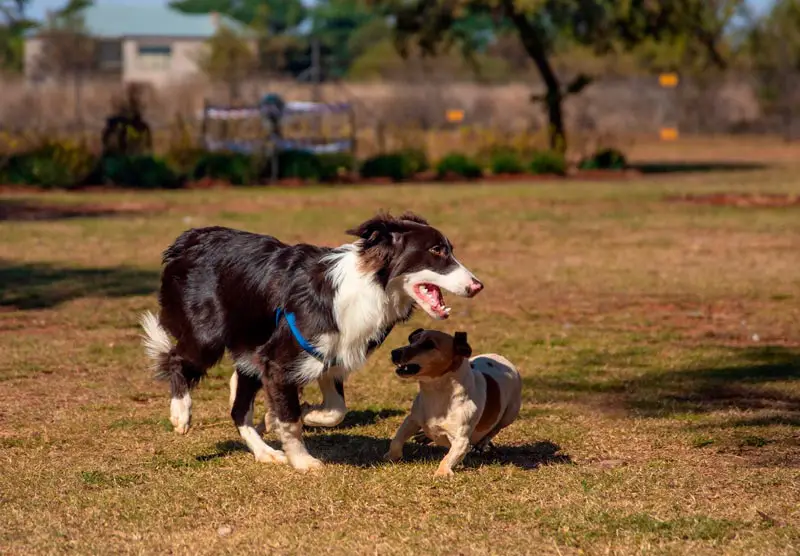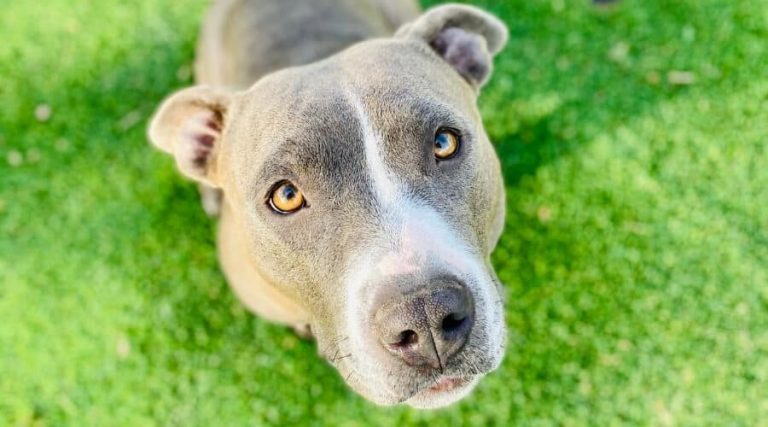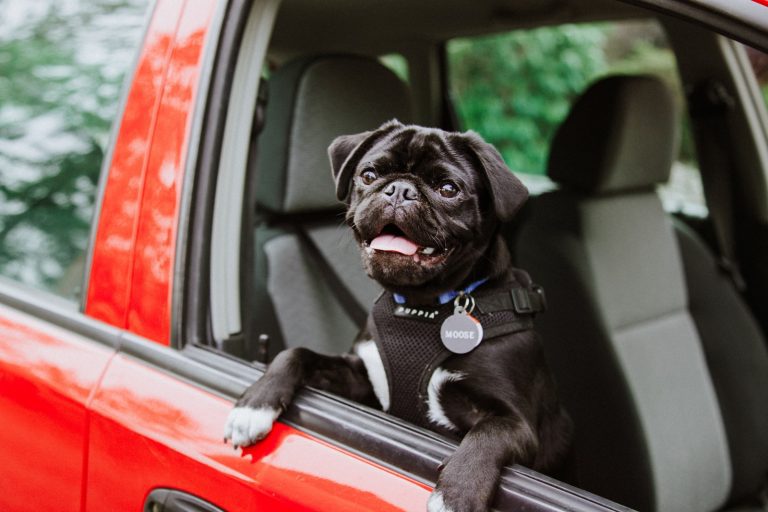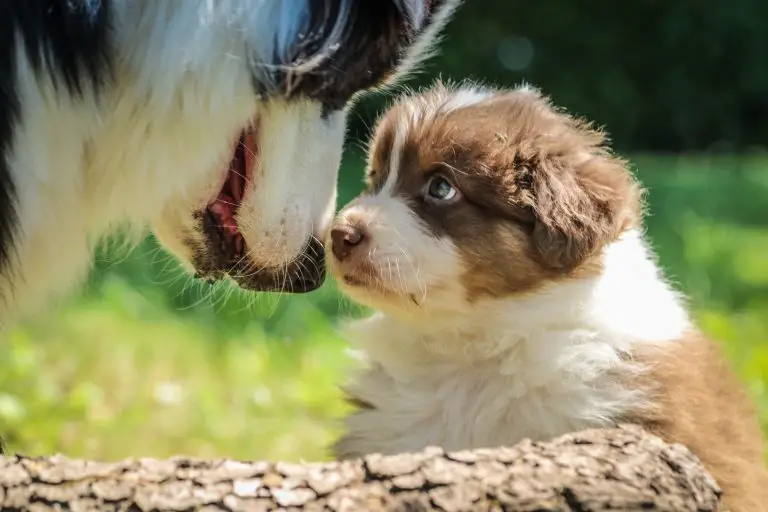Border Collies are renowned for their calm and composed nature; they are a responsible breed that is exceptionally obedient until they see another dog around.
If you own a Border collie, you may have been a witness to their aggressive response when they see dogs around them. “Do Border Collies get along with other dogs?” is a question that comes our way frequently as experts of dog behavior.
As trainers and experts of dog behavior, it is our job to get rid of any preconceived notions regarding a specific breed. However, dogs are a diverse bunch, where each one has a different personality and sense of individuality.
A dog generally inherits the personality it has, which means that the family tree has a fair say in how dogs behave. Therefore, it is essential to study dog behavior retrospectively too, and broadly categorize them based on their breeds. Considering Border Collies as a collective breed, it is safe to say that they are highly and aggressive and energetic.
Border Collies are not the only dog breed that dislikes being around other dogs. However, the history and the instinctive reaction of the dog breed exacerbate the problem.
Historically, Border Collies are one of the few dog breeds that were selectively bred with herd animals. This means that the dog reacts aggressively to any animal; it considers a threat to the herd.
The evolutionary process of Border Collies is one possible reason for their hostile attitude towards other dogs. Fortunately for the owners of the dog breed, Border Collies do give away signals that indicate anger and resentment for a scenario.
In this blog, we will discuss the various reasons for Border Collies hatred of other dog breeds and the signs a Border Collie gives before it lunges at an animal or a stranger.
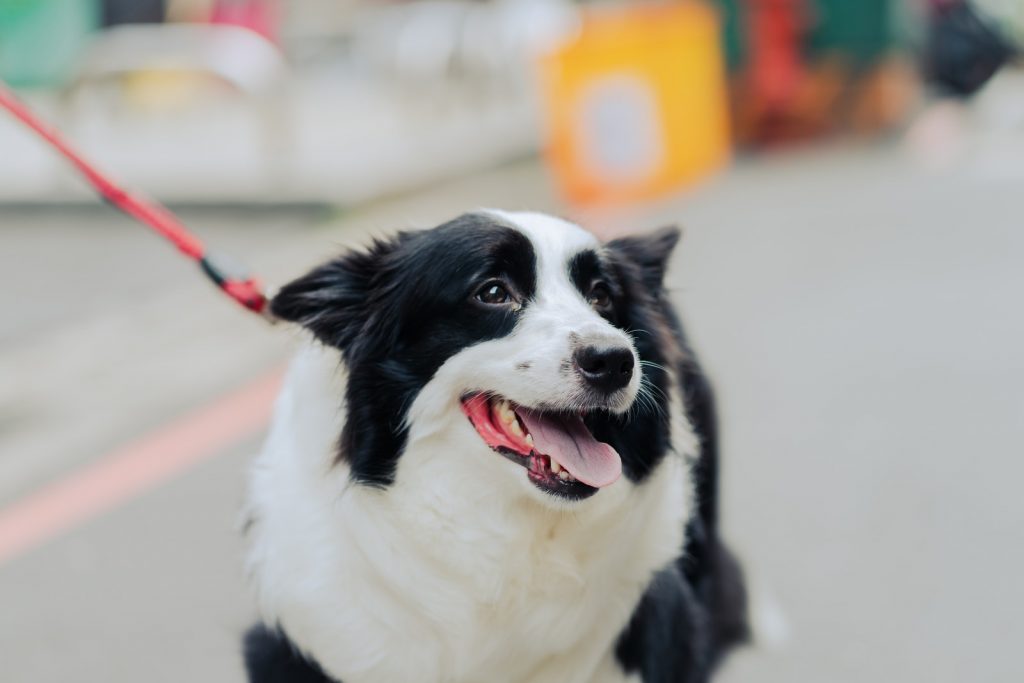
Are Border Collies Aggressive Dogs?
Yes! Border Collies are aggressive; the dogs have a high barking tendency and are not friendly to other animals either. In addition to the inherent reason mentioned above, the aggression of Border Collies stems from many other factors.
Let’s take a look at some of them to study their behavior in detail.
Threat
A Border collie shows aggression to all strangers and animals; it does not trust. A growl or a snarl from a collie is an indication that it does not want a person around. Untrained Border Collies are renowned for chasing the mailman or the delivery guy away.
Dominance
Like all herd dogs, Border collies also love to show dominance. It does not help when, as an owner, you are hesitant to show who is in charge. Since dogs are descendants of wolves, they consider the people around them as members of their pack.
Leaving their dominant attitude, unchecked means that you approve of their superiority. The collie feels that he or she is above you and your family members in the dog hierarchy.
This sense of superiority develops a dominant attitude in the dogs, and they don’t hesitate in barking or growling to impose their authority over the rest of the pack. So as an owner of a Border collie or any other breed, you need to ensure that you are the one dictating terms to them.
Food
Like other animals and dogs, Border Collies are unsure whether the food you give them will still be on the tray when you leave. They feel it is better to get rid of the food now before anyone steals it and takes it away. This is why you hear the nasty growl when you adjust the bowl or take away the collies bone.
Trained collies might not behave like this, but it is natural for them to react in a distrustful manner when you touch their food. If your dog is untrained and you lack control over them when eating, you should avoid taking their food or sticking a hand in their bowl.
In that case, you should also forget about messing with the collie when they are playing with a bone. A better idea will be to call the collie and offer a treat to distract them from the bone.
Physical Pain
Bearing physical pain is stressful for all of us. While we have doctors and friends and family to speak to during the pain, dogs and collies have no other option than showing aggression. Regardless of how deeply you and your collie trust each other, you should be cautious when inspecting his or her wounds.
The collie may snap aggressively if it feels the pain during an inspection. Similarly, the other dogs around may face your collie’s wrath if they get too close. The agitation and mistrust collies feel around strangers, and other dogs amplify when they are in pain.
These are some factors that explain the aggression in Border Collies. However, most of these factors are also found in other dog breeds too. The question is why we don’t see other breeds lunging or growling at strangers and other dogs with the same ferocity as a Border Collie.
Watch the video below on Border Collie aggression.
Are Border Collies Aggressive to Other Dogs?
Border Collies are incredibly calm, and they display aggression only when the factors mentioned above are present. However, their hostility increases when they come across other dogs.
Here are some reasons that explain the hostility the dog displays when facing other animals.
Genetic Behavior
While dogs do have traits of their own, their personalities are mostly shaped genetically. The breed a dog belongs to defines specific aspects of the behavioral characteristics it possesses. The same is true for Border Collies, as the behavior quirks they possess are passed on from generations.
Border Collies have a naturally low tolerance for rude or overbearing dogs. They even don’t prefer dogs bouncing off or getting too close to them. A snarl or a short bark is enough to tell the dog to back off.
Many owners consider this as aggression, but in reality, it is a way to prevent any designs of aggression from the other dog. It is a stern warning, and dogs that understand the communication method, back off immediately.
This is a natural behavior for a Border collie; a stranger giving you a bear hug in the middle of the street will not please you either. As a pup growing up, Border Collies may show the opposite behavior by befriending other dogs and playing with them.
However, they get very discriminatory once they grow up and begin maturing. A Border collie is a serious workhorse that does not appreciate obnoxious behavior from other dogs.
Fear
While genetic behavior quirks are one reason why Border Collies misbehave with other dogs, a lot of barking and lunging are triggered by concern and security. The breed’s instinct means that it is concerned about its survival and that of others around it when it sees other dogs. This is a reinforcing behavior and can be tamed with the help of the right conditioning.
Barrier Frustration
This is a problem synonymous to all dog owners. The wild nature of some Border Collies frustrates them easily when they are held by a leash or are placed behind a cage.
You may come across some Border Collies that lunge and bark at other dogs only because they are frustrated. Many might consider this behavior as blatant aggression, but as soon as you let them off the leash, you will be surprised to find out the social skills they display.
The excitement and change of behavior they show with the leash is called barrier frustration. This happens when a dog rejects the barrier that holds their enthusiasm — the frustration results in an explosion of lunging and barking that can be challenging to deal with.
This display of behavior is unlike the dogs that lack social skills and are untrained. It is important to remember that Border Collies do not hate dogs; it is just that some of them want to assert their dominance.
Alert to Movement
All the owners that ask the question “do Border Collies get along with other dogs” claim that their dog shows aggression to any animal or object that moves. The owners suggest that the Border collie stares at the animal or the dog for long periods before lunging or barking at it.
Border Collies are primarily herding dogs that are used for controlling the movements of sheep. The nature of the job they do demands them to be vigilant of the herd under their command. This means that the dog breed is alerted at the simplest of movements, triggering its attention. Their ability to notice movement is considerably higher than that of lapdogs.
Staring is another strategy that Border Collies use while herding. By staring intently in the direction of the sheep, a collie can get the herd moving. Since staring is an imitation of the wolves’ tactics of picking prey, sheep naturally respond to it.
This behavior is called the “giving eye” and is a common trait employed by Border Collies responsible for large flocks. The immobility a herd display causes frustration that can result in lunging or barking to get the sheep moving.
The herd driving behavior is instinctive. It is common in Border Collies that don’t have access to outlets that develop their social skills.

How to Control Border Collie Aggression?
Now that you know the answer to “do Border Collies get along with other dogs,” it is time for you to take measures to restrict the aggression and manage and foster their social skills. Here are some tips that you can implement on your dog and develop their personality.
The first thing that you need to highlight is what causes aggressive behavior in the Border collie. This will help you in getting a better understanding of your pup and develop a strategy in combating their anger.
If you feel that your dog is suffering from the dominance issue, then you need to work towards regaining the title of an alpha dog. Obedience training is the best way to restore the title and get the superiority you are looking for.
You need to be consistent in your training methods and ensure that you forego leniency when training your dog. Gradually after days of leading and training, your collie will identify who the master is and will follow your instructions.
Here are some other tips that you can follow to control the aggression in your Border Collie.
Keep Border Collies On a Leash
Dogs feel more vulnerable and frustrated when they are on a leash. Shortening the leash every time you see another dog around does not work either, as it gives a signal of impending danger, alerting the collie.
A better idea is to train the dog and work on their personality. Teaching them to follow your instructions and being obedient at all times is a better strategy than holding them on a leash.
Give Your Border Collie Treats
You can also teach them to do an emergency U-turn as soon as they see another dog approaching. If the Border collie gets nervous when it sees other dogs approaching, you should look to provide it with more space. Find a distance where the collie cannot notice the different breed and is less likely to respond to them.
Alienating the behavior of excitement and anger helps in setting a threshold for the dog and training them. You should reward the behavior generously as it can help your dog make eye contact and remain social with other animals.
Be sure to watch this video below on how to train an aggressive Border Collie.
Things You Should Avoid with an Aggressive Border Collie
The way you deal with an aggressive collie depends mainly on the reason for the aggression. Using wrong means for containing the aggression can further escalate matters and can result in enormous problems for the individual.
Here are some things that you should avoid when dealing with an aggressive Border collie.
Avoid Asserting Dominance
An aggressive collie is trying to show signs of dominance; this is why asserting your authority reinforces certain behavioral sparks that enhance the aggression. You should also avoid playing games that are based on dominance and aggression.
A tug of war, for example, is the kind of game that you should not play with a collie. You should also keep away from chasing games, since Border Collies’ love running around and showing their dominance over the herd.
Fetching is the perfect game for Border Collies; the game can teach them to be obedient and also allows you to be assertive.
Pressuring Your Border Collie
As an owner, you should avoid pressuring the dog when it is in a stressed state. It is never a good idea to get close to a dog that is growling; a growling dog is signaling you not to get any closer and stop what you are doing. Respect the dog’s wishes and stay at a distance, and get closer when they are calm enough to interact.
Hitting Your Border Collie
Avoid yelling, shouting, or hitting the collie, regardless of the aggression it shows you. Your job is to diffuse the situation and to ensure things don’t get any worse. These should be your last options, and you should only use them when you are under attack. If you think you are under danger, move away and go to a safe distance as soon as you can.
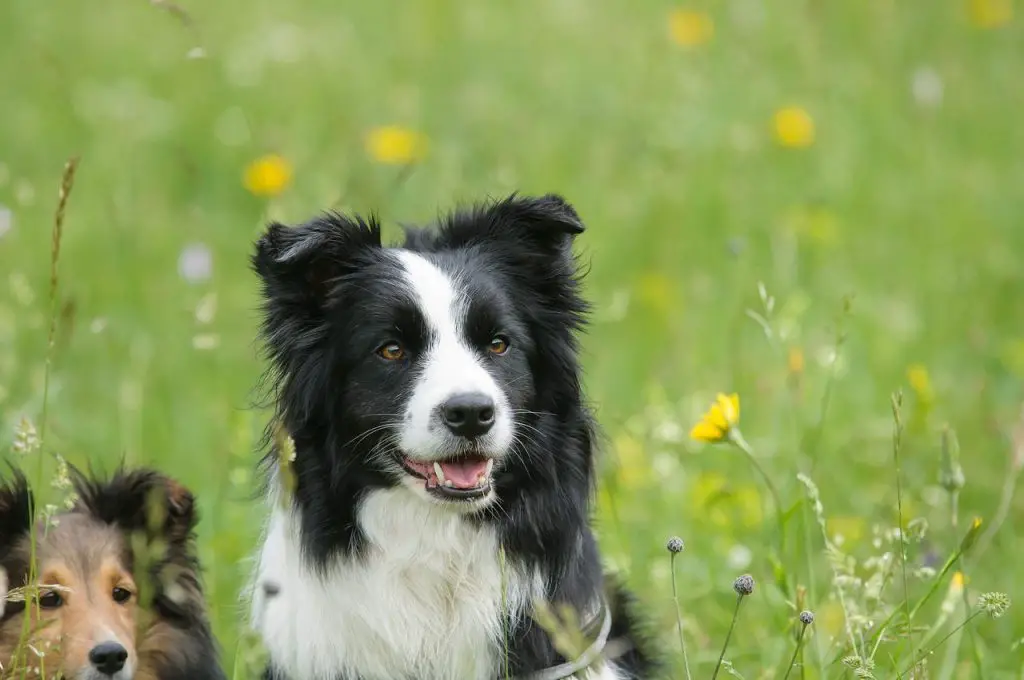
Parting Thoughts On Do Border Collies Get Along With Other Dogs
Border Collies, if well-trained, are one of the sweetest and adorable dog breeds in the whole world. While it is not easy to train an unsocial collie, the rewards are worth the effort. The traits and the layered personality they possess make them stand out from the rest of the breeds.
A dog only is only as confident and comfortable as its owner. This is why confidence is the key when dealing with Border Collies; a dog can sense uncertainty and nervousness in a person. Your collie is less likely to listen to you if you display these traits. Remember to feel confident at all times, and don’t forget to reward the collie if it shows obedience.
It is also essential to ensure that you give your Border collie the environment it needs to develop. A Border Collie is not a dog that you can raise in an apartment. The dog has its own needs, and a yard to run in and play in is one of them. Not tending to their needs can also build the levels of frustration in a Border collie; they are an energetic dog breed at the end of the day.
If you feel that your dog might bite someone and you are fearful, then you should not hesitate to call the trainer. Give them all the necessary details, and they will offer you a solution to diffuse the situation. Don’t take too long in ringing the trainer, as you don’t want your collie hurting anyone or biting another dog.
Daniel Bloom is the mind behind the Dog Pages blog. He created this blog for the love his dog, Augustine. He manages his team of contributors who love dogs as much as he does. When he is not blogging, he spends his time cooking and reading. He never misses his daily walks with his dog and loves to play Frisbee with Augustine whenever he gets a chance.

